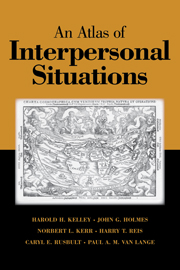Book contents
- Frontmatter
- Contents
- Preface
- PART ONE INTRODUCTION AND THEORY
- PART TWO THE SITUATIONS
- Single-Component Patterns
- Two- and Three-Component Patterns
- Time-Extended Patterns
- Incomplete Information Situations
- Entry #15 Negotiation: Can We Agree on a Deal?
- Entry #16 Encounters with Strangers: Lack of Information about a Partner
- Entry #17 Joint Decisions under Uncertainty: Bird in the Hand
- Entry #18 Twists of Fate: Coping with an Uncertain Future
- N-Person Situations
- Movement from One Situation to Another
- PART THREE EPILOGUE
- References
- Author Index
- Subject Index
Entry #16 - Encounters with Strangers: Lack of Information about a Partner
Published online by Cambridge University Press: 21 October 2009
- Frontmatter
- Contents
- Preface
- PART ONE INTRODUCTION AND THEORY
- PART TWO THE SITUATIONS
- Single-Component Patterns
- Two- and Three-Component Patterns
- Time-Extended Patterns
- Incomplete Information Situations
- Entry #15 Negotiation: Can We Agree on a Deal?
- Entry #16 Encounters with Strangers: Lack of Information about a Partner
- Entry #17 Joint Decisions under Uncertainty: Bird in the Hand
- Entry #18 Twists of Fate: Coping with an Uncertain Future
- N-Person Situations
- Movement from One Situation to Another
- PART THREE EPILOGUE
- References
- Author Index
- Subject Index
Summary
Examples
Two strangers on a train or plane become interdependent because they are seated next to each other, share an armrest, are able to interrupt each other's reading or thoughts by talking, the one in the aisle seat is required to get up to enable the person at the window seat to go to the lavatory, and so forth.
On the first day of classes, two new college students in a Freshman math class are made interdependent by being assigned to work on a particular problem together.
Two research subjects, not known to each other, are scheduled for a Prisoner's Dilemma experiment in which the outcome matrix is fully specified. Or, they may be in an “unstructured” situation, left alone together on the pretext of waiting for separate interview rooms to become available, but covertly observed and recorded.
In dozens of studies in child development, an infant, either alone or accompanied by its mother, is confronted with a stranger who moves into various degrees of proximity to the child or says or does various things to it.
Conceptual Description
We describe this as “encounters with strangers” in order to refer to both the “situation” and the “persons.” This entry is appropriate for our Atlas of situations because, as explained below, each person's lack of information about the unknown partner almost inevitably results in some lack of information about the situation. Thus, the situations for these encounters are located in the “incomplete information” portion of the domain of interdependence situations.
- Type
- Chapter
- Information
- An Atlas of Interpersonal Situations , pp. 338 - 352Publisher: Cambridge University PressPrint publication year: 2003



